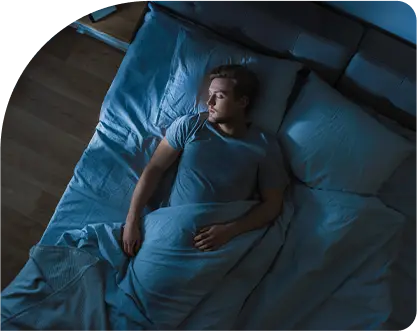The Connection Between Melatonin and Testosterone
Published: 2025-05-21
 Updated: 2025-12-17
Updated: 2025-12-17
4 mins
Getting enough high-quality sleep isn’t just about feeling rested – it’s essential for hormone regulation and overall health. During sleep, your body restores energy, repairs tissue, and releases critical hormones that help regulate everything from metabolism to mood. For men in particular, sleep plays a major role in maintaining healthy testosterone levels, which are key to libido, muscle mass, energy, and emotional well-being.
Two important hormones that come into play here are melatonin and testosterone. Melatonin helps control the body’s internal clock and signals when it’s time to sleep, while testosterone supports numerous physical and sexual health functions in men.
In this article, we’ll take a closer look at how sleep quality influences testosterone, how melatonin fits into the picture, and how these hormones – along with estrogen – interact in more complex ways than most people realize.
Need a testosterone solution?
Elevate your vitality and supercharge your life with Rex MD.
Get Started
How Does Melatonin Affect Testosterone?
While melatonin and testosterone serve different primary functions in the body, they’re actually very closely linked – especially when it comes to sleep, stress, and hormonal balance.
Melatonin is a hormone produced by the pineal gland in the brain, primarily in response to darkness. Its main job is to regulate your circadian rhythm – your internal 24-hour clock that tells your body when to feel sleepy and when to be alert. Melatonin levels typically rise in the evening, helping you wind down and fall asleep, and then drop in the morning as daylight returns.
Testosterone, on the other hand, plays a central role in male health. It influences libido, muscle mass, bone density, energy levels, and mood. Testosterone is released in a pulsatile fashion throughout the day, but most of it is produced during sleep – especially during the deeper, restorative stages.
This is where the overlap occurs. Melatonin doesn’t directly trigger testosterone production, but by helping regulate your sleep cycle, it creates the conditions under which your body can naturally produce testosterone. In this sense, melatonin may indirectly support testosterone by promoting higher-quality, consistent sleep.
How Melatonin, Testosterone, and Estrogen Work Together
While testosterone is commonly seen as the “male” hormone and estrogen as the “female” hormone, both are essential in men’s health – and melatonin may play a subtle yet meaningful role in how these hormones function.
Melatonin doesn’t just influence sleep – it also interacts with hormone signaling in the brain, including the pathways that regulate both testosterone and estrogen. Research shows that melatonin receptors are present in parts of the brain that control reproductive hormone release, suggesting it may help fine-tune the signals that initiate testosterone production via the hypothalamic-pituitary-gonadal (HPG) axis.
Beyond signaling, melatonin also has antioxidant properties that may benefit hormone health. Some studies suggest melatonin could help protect Leydig cells – the cells in the testes responsible for producing testosterone – from oxidative stress. This protective role may be especially relevant with aging, when both melatonin production and testosterone levels naturally decline.
It’s also important to understand that hormonal balance doesn’t rely on testosterone alone. Men need a small but critical amount of estrogen, which is derived from testosterone, to support brain function, libido, and bone health. Disruptions in one hormone can impact the others – highlighting how estrogen, testosterone, and melatonin are part of a broader endocrine network.
Ultimately, keeping this balance in check often starts with good sleep. Melatonin, by promoting healthy sleep and helping regulate hormone release, may quietly support the stability of both male and female sex hormones in men.
Sleep and Testosterone: Why Quality Sleep Matters
The connection between sleep and testosterone is one of the most well-established – and often overlooked – links in men’s health.
Testosterone is primarily produced at night, with the highest levels occurring during REM (rapid eye movement) sleep and the deeper stages of non-REM sleep. That means if your sleep is cut short, interrupted, or poor in quality, your body may miss out on its prime window for testosterone production. Even a single night of inadequate rest can lead to a measurable drop in testosterone the next morning.
Over time, chronic sleep deprivation takes a larger toll. In one study, healthy young men who slept only five hours per night for one week experienced a 10–15% reduction in daytime testosterone levels.
Another study found that men with sleep apnea – a condition that fragments sleep – tend to have significantly lower testosterone compared to those without the condition.
This works both ways: low testosterone can also contribute to poor sleep, creating a cycle that’s hard to break. That's why optimizing testosterone and sleep together can lead to meaningful improvements in energy, mood, and overall well-being.
Ultimately, protecting your sleep is essential for maintaining hormonal health. If you’re not getting enough deep, restful sleep, your testosterone levels may be paying the price.
Tired of insomnia?
Explore prescription medications tailored to help you get better sleep.
Get Started
Should You Take Melatonin to Support Testosterone?
If you’re struggling with sleep and worried about low testosterone, you might be wondering whether melatonin supplements can help. While melatonin isn’t a testosterone booster, it can support the conditions your body needs to produce testosterone naturally – mainly by improving sleep.
For some people, melatonin supplementation can be helpful, especially in situations where the body’s natural melatonin production is disrupted. This includes:
Shift workers with irregular sleep patterns
Frequent travelers dealing with jet lag
Individuals with poor sleep hygiene or difficulty falling asleep due to stress or light exposure
By promoting a more consistent sleep cycle, melatonin may indirectly support testosterone production, especially if your hormone levels have been impacted by chronic sleep deprivation.
That said, melatonin isn’t for everyone. People with hormonal imbalances, those undergoing testosterone replacement therapy, or anyone taking medications that affect the endocrine system should be cautious. While low doses are generally considered safe, high doses taken long-term may potentially interfere with hormone signaling in some individuals – especially if used without medical guidance.
In short, melatonin isn’t a cure-all for low testosterone, but if your sleep is suffering and you’re looking for a short-term way to reset your circadian rhythm, it may be worth considering – with your doctor’s input. As always, improving your sleep environment, stress levels, and lifestyle habits should be your first line of defense.
When to See a Doctor About Testosterone or Sleep Concerns
It’s easy to overlook symptoms like low energy or poor sleep, but they may be signaling something deeper. Low testosterone often shows up in ways that can be mistaken for everyday stress or aging – like persistent fatigue, reduced libido, mood changes, difficulty concentrating, or even changes in body composition. If these symptoms stick around or begin to interfere with your daily life, it’s worth talking to a healthcare provider.
The Rex MD Testosterone Program may help you feel like yourself again. If you qualify, your provider will help you determine the best treatment for balancing your hormone levels.
To find out if the program is right for you, answer a few questions about your symptoms and medical history. Your provider will order lab work for you and determine if you’re eligible for treatment options based on your results.
Then, you’ll be able to schedule a virtual call with your Rex MD-affiliated physician.
Get started today.














